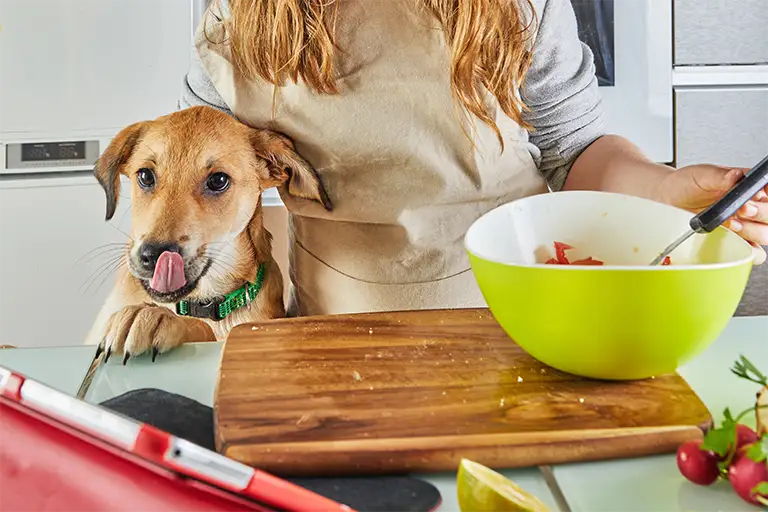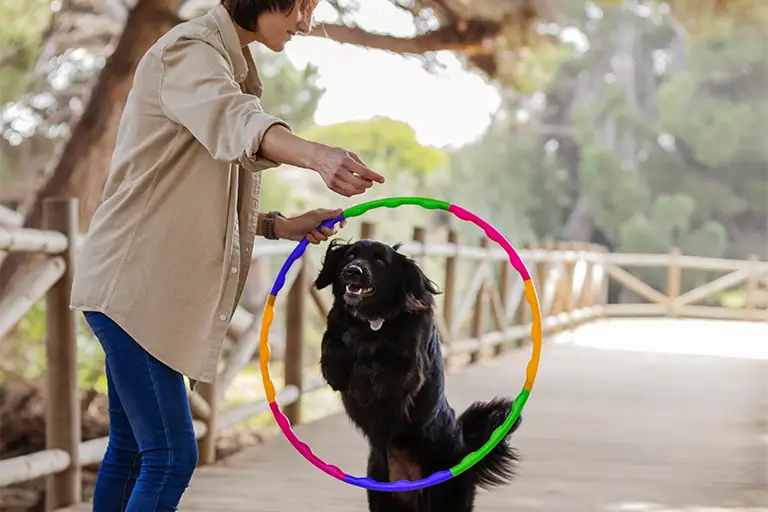Are you struggling with the issue of your dog eating poop?
This behavior, known as coprophagia, is surprisingly common.
It can be distressing, unhygienic, and potentially harmful to your dog’s health.
Let’s dive into effective solutions.
Stats about Coprophagia
Coprophagia is quite common among dogs. Studies show that up to 24% of dogs have been observed eating feces at least once.
However, only 16% of dogs are classified as “serious” stool eaters. These are eating feces more than five times.
Puppies are more likely to engage in this behavior, with 38% of puppies known to practice coprophagia.
This rate decreases as dogs grow older.
Why do they do it?
There are several reasons why dogs eating poop. The most common theory relates to diet. Nearly 81% of pet owners reports improvements after dietary changes.
Why Is My Dog Eating Poop
Nutrient Deficiency
A well-balanced diet is important for your dog.
If your dog is not getting the right nutrients from their food, they might eat poop as a way to regain those missing elements.
Certain vitamins and minerals, such as vitamin B and K, are often lacking in commercial dog foods. So, when your dog eats poop, it might be a sign they are not getting a balanced diet.
Health Issues
Certain medical conditions (like diabetes, thyroid issues, or malabsorption syndromes) can increase your dog’s appetite.
Your dog with these conditions might feel hungry all the time, even after eating a full meal.
This forces your dog to consume feces as an extra food source.
In addition, parasites can strip your dog of essential nutrients.
This leads to hunger and subsequent coprophagia.
Enzyme Deficiency
Wild ancestors of dogs consumed prey animals. This supplies them digestive enzymes.
In contrast, modern dogs on commercial diets might miss out on these important enzymes, as a result, undigested food in their stools.
This food can be attractive to them.
It may cause them to consume their feces.
Behavioral Issues

When your dog is bored, anxious, or stressed, this leads to undesired behaviors like shedding and eating poop.
When left alone for long periods or without enough stimulation, your dog might eat poop as a coping mechanism in stressful environments,
Cleanliness
Mother dogs have a natural instinct to keep their place clean.
They may eat their puppies’ poop, especially when caring for young puppies.
Puppy Exploration
Puppies are naturally curious.
They explore their surroundings by tasting everything, including poop.
This behavior is a regular part of their exploration.
Many puppies grow out of this phase.
If this is not addressed properly at the right time, some might carry this habit into their adult years.
Copied Behavior
Dogs learn a lot from watching other dogs.
If your dog sees another dog eating poop, they may be inclined to mimic the act.
This trend is especially valid in homes with multiple dogs.
Practical Solutions
It includes a combination of medical treatment, behavioral modifications, and other tips.
You can find several practical solutions below;
Improve Their Diet

Feeding your dog goes beyond simply making sure they are full.
It’s about recognizing the specific nutritional requirements based on their age, breed, and size.
Nutrient deficiencies in your dog may lead to important health issues.
That is why choosing premium high quality food enriched with vital nutrients is crucial.
Health Issues
Health issues in your dogs can vary from digestive challenges to diabetes or thyroid disorders.
If your dog is suffering from certain conditions, they may eat feces in order to compensate for nutritional imbalances or deficiencies.
An early detection of these health issues allows for the treatment.
Make sure your dog has regular check-ups enabling your vet to monitor your pet’s health closely. This may catch some potential problems early on.
During the regular check-ups, you should inform your vet about any changes in your dog’s behavior, including coprophagia.
In this way, you are addressing the potential root causes (health issues).
Provide Digestive Enzymes
Digestive enzymes are essential proteins.
They help break down the food your dog eats.
This makes it easier for nutrients to be absorbed into the bloodstream.
If your dog lacks these enzymes, it might face some challenges when extracting nutrients from food potentially leading to coprophagia.
You can enhance your dog’s digestion and nutrient absorption if you add these enzymes to your dog’s diet.
While many commercial dog foods contain digestive enzymes, processing stage may often degrade these valuable proteins.
In this case, you can use raw pancreas extracts to plant-based enzyme supplements available on the market.
Please don’t forget, it’s important to consult with your veterinarian before introducing any supplements to your dog.
Exercise and Mental Stimulation

There is no doubt that regular physical exercise for your dog’s wellbeing is fundamental.
It helps maintain an optimal weight and enhances cardiovascular health. It also strengthens muscles and bones. Most importantly, as a result, it helps spend excessive energy.
An adequately exercised dog is less likely to engage undesirable behaviors such as eating poop.
You can achieve this through regular walks, playtime in the yard, agility training and swimming sessions.
In addition to physical activity, mental stimulation is equally important.
It keeps your dog’s mind sharp and engaged.
You may want to consider the following activities in order to keep your dog mentally stimulated.
Interactive toys challenge your dog to solve a problem for a treat.
You can teach new commands or games in regular training sessions.
Another one, nose work activities allow your dog to utilize its natural scent-tracking abilities. It offers both mental and sensory engagement.
Pumpkin, Pineapple, and Bananas
Pumpkin is rich in fiber that adds bulk to your dog’s stool.
Fiber helps in overall digestion.
Because of its mild flavor, you can easily mix pumpkin into your dog’s meals as an effective solution.
Pineapple, is another dietary addition that contains an enzyme called bromelain. This may alter the taste of your dog’s feces. So, it makes it less appetizing.
Lastly, you can use bananas as a natural way to stop your dog eating poop.
Since bananas are high in sugar, you should give it in moderation.
Similar to pineapple, bananas can also alter the taste of feces
It’s important to introduce these foods to your dog’s diet slowly.
It should be under the guidance of a veterinarian.
Clean Up Immediately
If there’s no poop available for your dog to eat, there is no way to eat it.
It’s straightforward.
You can immediately remove the feces from your dog’s environment in order to reduce the chance of coprophagia occurring.
A clean environment reduces the risk of your dog picking up parasites or infections.
This is especially important for multi-dog households, where diseases can easily spread.
However, remember that clean-up is not just limited to your backyard or garden.
If you take your dog for regular walks, please always carry waste bags to pick up after your pet.
Using Deterrents
Commercial deterrents are often available as additives.
You can mix into your dog’s food.
When the food is digested and excreted, the additives create an unpleasant taste, like in pineapple and banana case.
This can discourage future attempts since the taste is unpalatable.
Follow the usage instructions carefully to make sure it’s safe for your pet.
A short period of usage the deterrent may not give the desired results.
It is especially true for the dogs that has a long-standing habit of eating poop.
You should use it consistently until your dog stop eating poop.
Before you choose a commercial deterrent, please discuss with your vet if it is appropriate.
Conclusion
Which of these tips are you going to implement first?
Are you planning to enrich your dog’s diet with foods like pumpkin, pineapple, and bananas?
or
Are you considering to use commercial deterrents?
Maybe you’re thinking of increasing the amount of exercise and mental stimulation your pet receives.
If you found this post useful, please leave a comment below and consider sharing it on your social media.
And don’t forget to subscribe to our email list for more tips.
References
Hart, B. L., Hart, L. A., Thigpen, A. P., & Willits, N. H. (2018). The paradox of canine conspecific coprophagy. Veterinary Medicine and Science, 4(2), 106-114. https://doi.org/10.1002/vms3.92
Beaver, B. V. (2009). Canine Behavior: Insights and Answers, 2nd Edition. Saunders Ltd.


